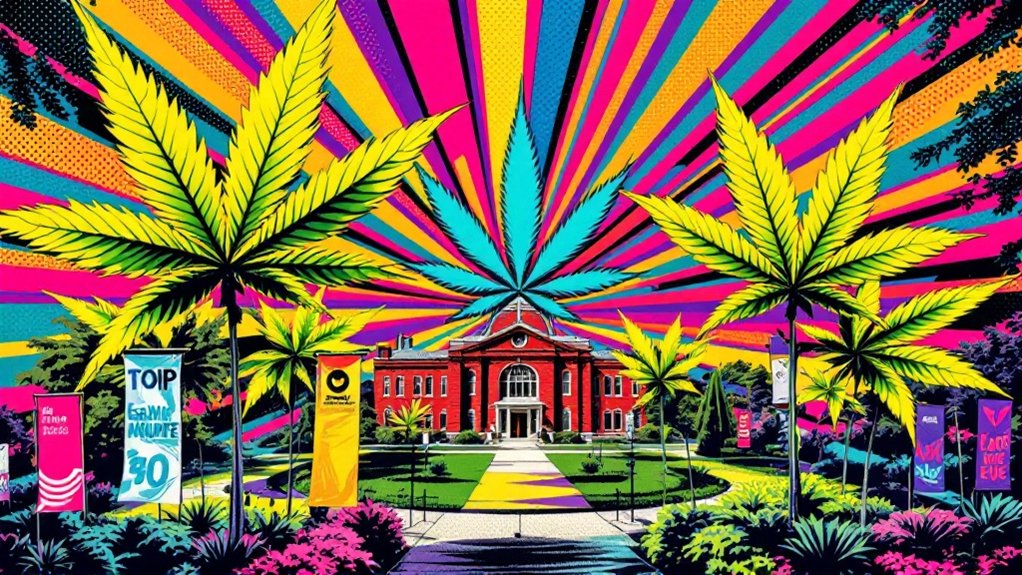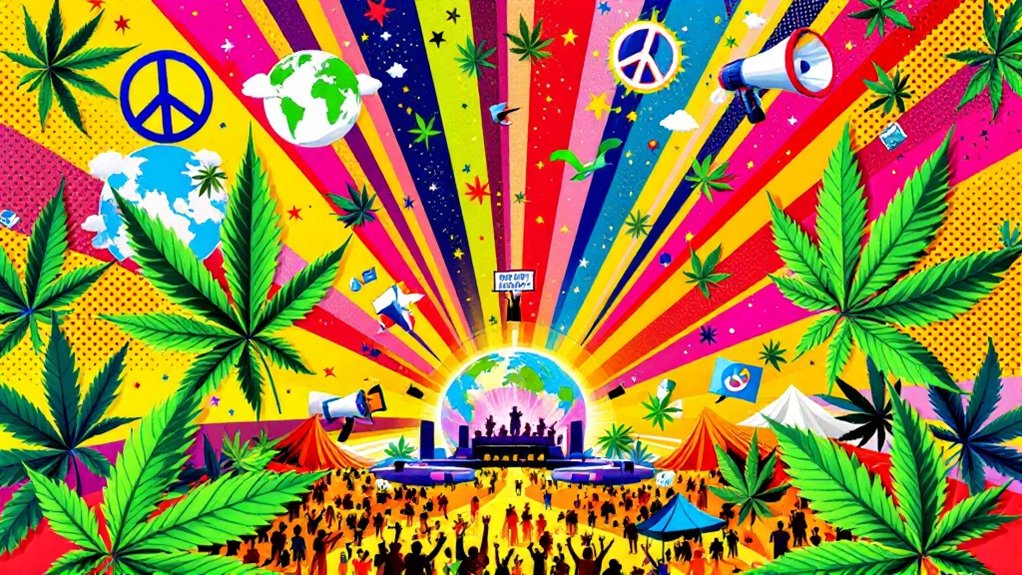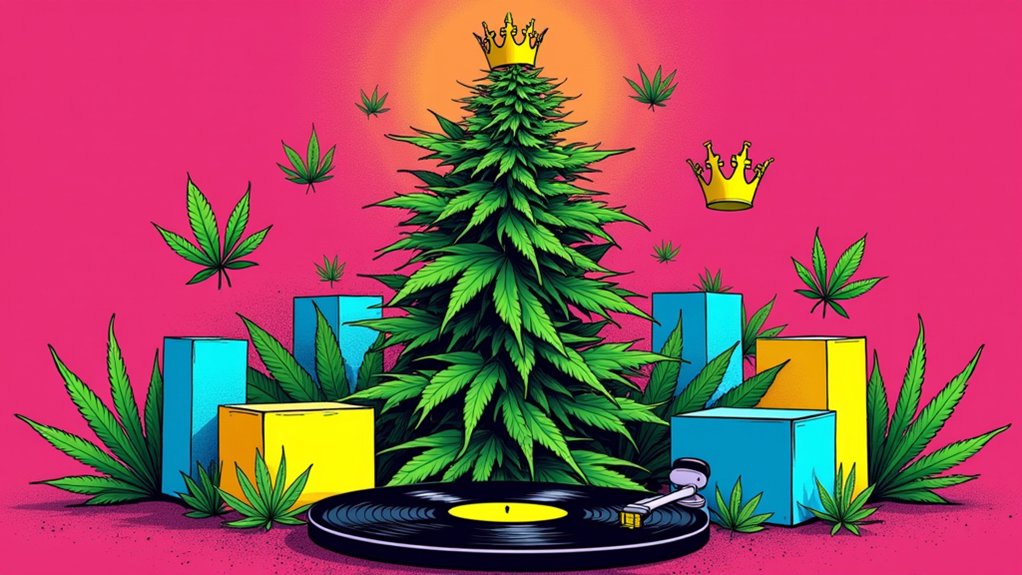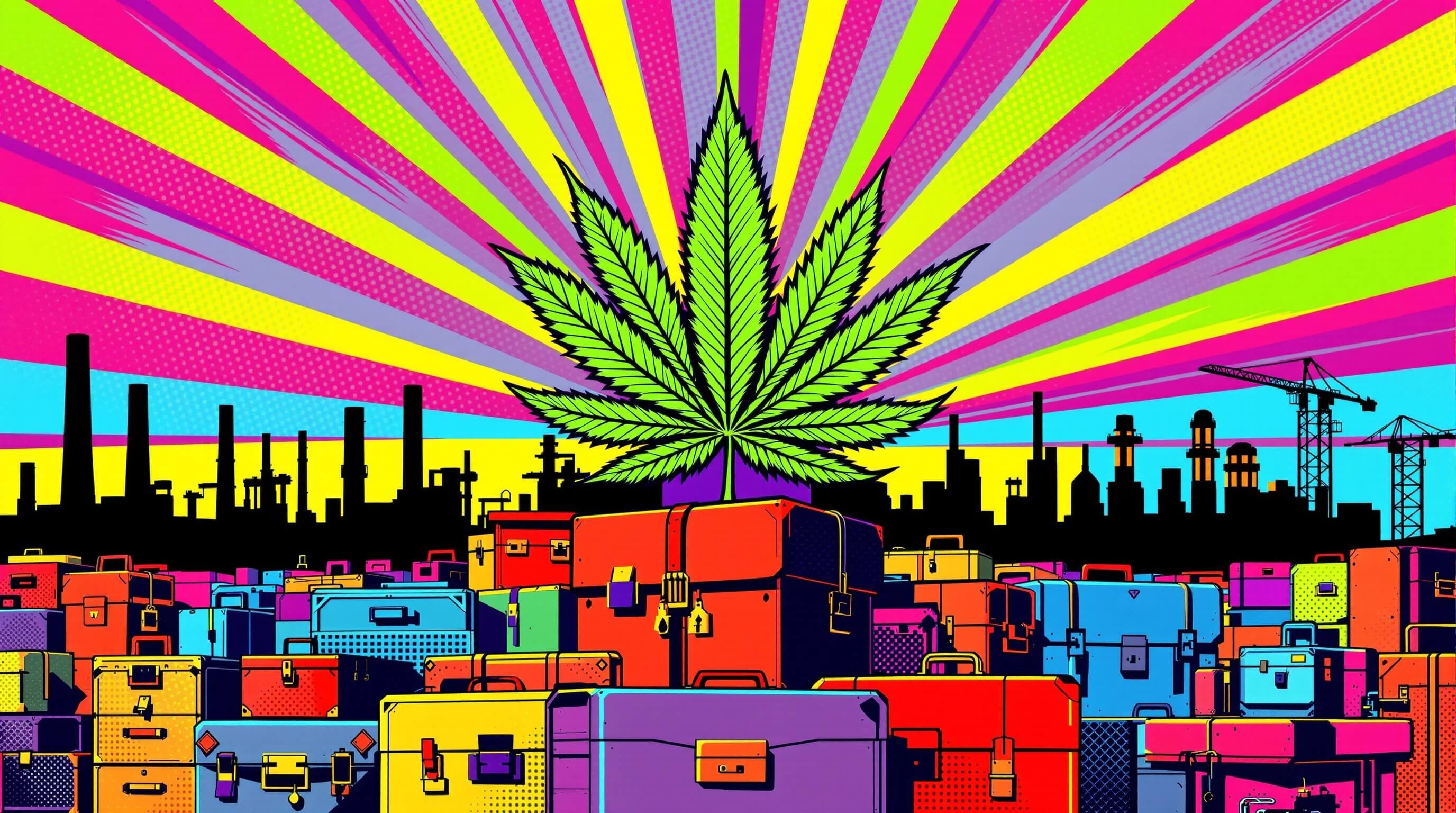Every spring in Ann Arbor, thousands gather on the University of Michigan Diag for Hash Bash, transforming academic grounds into America’s longest-running cannabis protest festival. The event began in 1972 as a response to harsh marijuana penalties, drawing just a few hundred activists. Today it attracts over 10,000 participants annually. Speakers address crowds between musical performances while attendees openly challenge federal drug laws. This unlikely university tradition has sparked similar movements across continents, but the real story lies in how these festivals are reshaping legislation.
The Birth of Hash Bash: How Ann Arbor Started a Movement

How does a single court decision spark a movement that endures for over five decades? The March 9, 1972, Michigan Supreme Court ruling overturning John Sinclair’s marijuana conviction temporarily left the state without enforceable cannabis prohibition.
Enter Hash Bash.
A grassroots cannabis celebration was born from legal momentum and activist determination.
Organized by counterculture activists and the Youth International Party, the first Hash Bash launched April 1, 1972, on the University of Michigan’s Central Campus. The timing wasn’t coincidental. Sinclair, imprisoned in 1969 for possessing two joints, had become a symbolic figure whose release galvanized supporters nationwide.
Ann Arbor’s progressive marijuana policies provided fertile ground. The city had already reduced possession to minor infractions with small fines. This marijuana-friendly culture also inspired local businesses like Zingerman’s to embrace the counterculture spirit in their own creative ways.
What started with 150-500 attendees quickly exploded to 3,000 by 1973, establishing the template for cannabis advocacy festivals across America. Chef Ra became a legendary fixture at the event, participating for nineteen consecutive years until his death in 2006.
Political Resistance Meets Community Celebration
While Hash Bash began as a celebration of temporary legal loopholes, it quickly evolved into something far more strategic, a fusion of political insurgency and community festival that would define cannabis advocacy for generations.
These gatherings transformed into powerful mobilization tools, modeling strategies directly from military insurgency principles. Organizers systematically undermined government legitimacy while rallying public support through celebration rather than confrontation.
Hash Bash and similar festivals became symbolic litmus tests for broader debates about personal judgment versus law and order. The events deliberately associated marijuana use with youth rebellion and counterculture movements, particularly during anti-war eras.
Political resistance built on assertive personal liberties, challenging perceived government overreach through community bonding. These festivals weaponized joy, proving that political insurgency could taste like funnel cake and sound like live music. Similar to Mexico’s struggle where Supreme Court ruling declared cannabis prohibition unconstitutional yet full legalization remains elusive, these gatherings highlighted the disconnect between shifting public opinion and legislative action. The momentum from these grassroots celebrations helped fuel advocacy groups that would eventually push for the formal legislative reforms seen across multiple states today.
The cultural shift gained further momentum as mainstream publications began questioning marijuana’s legal status, lending credibility to what had previously been dismissed as fringe movements.
Growing Numbers: From Hundreds to Thousands of Participants
From a modest gathering of 150 to 500 attendees in 1972, Hash Bash experienced explosive growth that transformed it from a small-town protest into one of America’s most prominent cannabis advocacy events.
By 1973, participation surged to 3,000, including supportive public officials who legitimized the movement.
The numbers tell a compelling story of cultural shift. After dropping to zero attendance by 1985 during the “Just Say No” era, Hash Bash roared back in 1988 with 2,000 participants, thanks to High Times’ “Freedom Fighters.”
The 1989 event swelled to 5,000 attendees.
Strategic changes amplified growth. Moving the event from April 1 to the first Saturday in April in 1991 boosted accessibility. The University of Michigan initially denied permits for the 1990 event, leading to legal battles over the venue.
Michigan’s medical marijuana legalization sparked renewed interest, with attendance climbing from 1,600 in 2009 to consistently reaching 8,000-15,000 by the mid-2010s. The event’s remarkable milestone came in 2022, when Hash Bash celebrated its 50th anniversary with over 10,000 attendees and zero arrests.
Music, Speeches, and Civil Disobedience on the University Diag
As attendees stream onto the University of Michigan’s iconic Diag each spring, they encounter a carefully orchestrated blend of counterculture performance, political messaging, and deliberate law-breaking that transforms the academic quad into America’s most visible stage for cannabis civil disobedience.
Live music anchors the festival atmosphere, with rock, folk, and reggae acts energizing crowds between activist speeches. The 1988 appearance by High Times’ “Freedom Fighters” dressed as Revolutionary War Minutemen exemplified Hash Bash’s theatrical protest spirit.
Political messaging comes from activists, politicians, and celebrities advocating marijuana reform. State Representative Perry Bullard made headlines in 1973 by openly consuming cannabis onstage. Chef Ra, a fixture for nineteen years, typified the event’s dedicated speakers. The event also features educational speakers who provide information about cannabis policy and reform efforts.
Mass public consumption serves as coordinated civil disobedience, directly challenging federal prohibition laws on this symbolically powerful campus gathering space.
Inspiring Worldwide Cannabis Festivals and Reform Movements

The University of Michigan’s Hash Bash sparked a global phenomenon that transformed cannabis activism from isolated protests into coordinated international movements spanning six continents.
What began as a single university protest evolved into a worldwide network of cannabis advocacy events across every inhabited continent.
Amsterdam’s Cannabis Bevrijdingsdag draws 5,000 participants in peaceful celebration, while Berlin’s Hanfparade attracts 10,000 attendees with significantly high youth engagement. These European gatherings demonstrate regional diversity in cannabis culture and consumption patterns. Events in cannabis legal countries continue to evolve as more nations reform their laws, with Canada and Uruguay pioneering comprehensive legalization frameworks.
Meanwhile, America’s festival circuit has evolved into serious business advocacy. MJBizCon commands over 30,000 industry leaders in Las Vegas, making it the world’s largest cannabis trade event. The cannabis sector’s rapidly growing demand for analytics has transformed these gatherings into essential hubs for data-driven business decisions.
California’s Emerald Cup celebrates harvest season with 20,000+ attendees annually. The National Cannabis Festival in Washington D.C. merges entertainment with policy summits, marking its 10th anniversary in 2025. The Cannabis Drinks Expo showcases beverage innovations as manufacturers and distributors explore this emerging market segment.
These events collectively normalize cannabis through education, legislative advocacy, and cultural celebration, proving festivals remain powerful catalysts for reform.
Looking for more? Check out our series on The New Cannabis Culture










